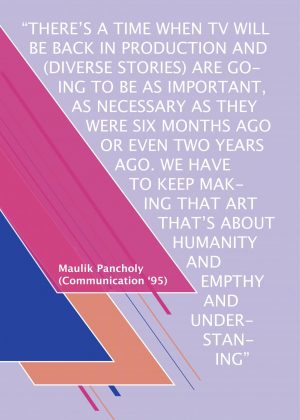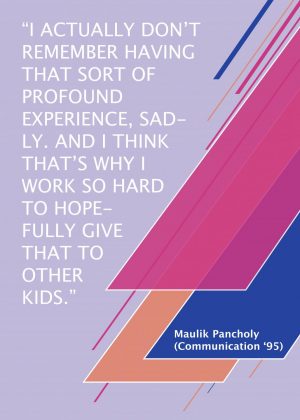The Best At It: Author, actor, activist and NU alum Maulik Pancholy talks AAPI, LGBTQ+ representation
June 4, 2020
The Monthly
When Maulik Pancholy (Communication ‘95) is asked about the first book or TV show where he saw part of his identity represented, he lets out a quiet sigh.
“I actually don’t remember having that sort of profound experience, sadly,” Pancholy said. “And I think that’s why I work so hard to hopefully give that to other kids.”
Older audiences might recognize Pancholy as the actor who played Jonathan from “30 Rock” and Sanjay from “Weeds.” But to children, he’s perhaps better known as the voice of Baljeet, a role he’ll reprise this summer in the “Phineas and Ferb: Candace Against the Universe” movie, or as Ranjeet in Disney Junior’s ongoing animated series with an all-South Asian cast, “Mira, Royal Detective.”
In addition to acting, Pancholy also devotes much of his time to his nonprofit, Act to Change, which focuses on supporting Asian American and Pacific Islander youth who face bullying.
This past October, he continued his outreach to children with the release of his debut fiction novel, “The Best At It.” Aimed at readers ages 8 to 14, the book follows 12-year-old, bullied Rahul as he realizes he might be gay. Optimistic in spite of his hardships, Rahul undergoes a journey to find something that he’s the best at.
Pancholy shares some characteristics with Rahul; he’s also gay, an Indian American and has what he describes as not OCD, but “checking behaviors.” But they differ — Pancholy said when he was 12, he didn’t have the courage to talk about being gay, which he viewed as shameful.
“The scene where he sort of stands up for himself at the end of the book, I found pretty emotional to say it out loud (when recording the audiobook),” Pancholy said. “And I think it’s because I didn’t do that as a kid, I didn’t get the chance to do what he did. That’s why I wrote that scene.”
Pancholy’s editor, Alessandra Balzer, said he has a talent for capturing the voice needed for middle grade writing so kids can process themes of romantic feelings and identity in an authentic way. She said books featuring LGBTQ+ kids have faced censorship, from schools canceling book events or having authors speak to teenagers even when their book is intended for younger audiences.
“The publishing community embraces these books because we know how much kids need them,” Balzer said. “We just try to educate people, publish the best books we can and support them, and hope that they’re gonna reach those kids who really need them.”
While on tour for “The Best At It,” Pancholy said students came up to him to share that they related to one of Rahul’s struggles with identity. A teacher stopped him in a parking lot to tell him he was courageous for being able to stand in front of the kids and say he was gay, because she wasn’t sure she could.
In 2014, after being in a relationship for nine years, Pancholy and his husband Ryan Corvaia proposed to each other at the Taj Mahal in India, which had at the time recently upheld Section 377, criminalizing homosexual activity; the section would be struck down in 2018. Gay marriage was still not yet legal in the United States.
While he said LGBTQ+ visibility has certainly gotten better since then — at one school visit, 700 kids cheered when he showed a picture with his husband in a presentation — there are still issues around acceptance. Some parents of students at that same expressed anger he had been invited, suggesting he was sexualizing children.
Pancholy said society needs to have better conversations around queer sexuality, and not distinguish between what type is acceptable for children. He pointed to the ’80s show “The Wonder Years,” where 12-year-old Kevin Arnold kisses Winnie Cooper and then checks out a book called “Everything You Always Wanted to Know about Sex (But Were Afraid to Ask).”
“Audiences fell in love with that,” Pancholy said. “And I think that we have this narrative that if LGBTQ+ kids have those same feelings, there’s something wrong about it or they just don’t know any better. We have to change that rhetoric.”
Pancholy describes the theater program at Northwestern as a “bed of creativity,” where he was encouraged to be creative and explore. However, he said he was still harboring secrets at school, where he was still firmly in the closet.
“I was pushing stuff away about myself because I thought I had to be someone else if I was to survive in the world,” Pancholy said. “I think my 20-year-old self would see me now and be like, ‘Wow, there’s other possibilities.’”
Pancholy said he began to feel a “real push” toward activism when Asian and LGBTQ+ community nonprofits began inviting him to speak at events after his TV acting career took off. He said he realized he could use his platform for advocacy.
In 2014, President Barack Obama appointed Pancholy to serve on the President’s Advisory Commission on Asian Americans and Pacific Islanders. There, Pancholy worked in a White House AAPI-focused anti-bullying task force and helped launch Act to Change, then a public awareness campaign.
“As an actor, he doesn’t have to be involved in community, in activism, but he chooses to be because he clearly is very passionate about what he does,” said Rebecca Lee, who met Pancholy while working as the communications director for the White House’s Initiative on Asian Americans and Pacific Islanders.
Lee said Pancholy lent a unique voice and platform in bridging Hollywood and advocacy. But in 2017, Pancholy was one of ten commissioners who resigned, citing Trump administration actions.
Part of a White House campaign’s mission is to increase access to federal programs — meaning recommendations around bullying included asking people to report incidents to the federal government.
“We literally can’t come to a Muslim kid who’s being bullied and say, ‘You need to report this to the Department of Justice,’ when there was a perception that the White House was creating lists of people of the Muslim faith to deport them,” Pancholy said. “Or undocumented people, or immigrants who are also part of our community that we serve. And so in order to continue doing the work, it was just kind of a no-brainer.”
Alongside Lee and Jill Yu, who both now serve as managing directors, Maulik went on to co-found Act to Change as an independent nonprofit. In recent months, Lee, who serves as the organization’s managing director, said the organization has kept busy addressing bullying and hate that has been “exacerbated” by the pandemic.
As the chair of Act to Change, Pancholy has hosted “COVID-19 Convos” with guests from former U.S. Surgeon General Vivek Murthy to Congresswoman Grace Meng and basketball player Jeremy Lin. He said 200 organizations and most major US cities partnered with the nonprofit for its second observance of the AAPI Day Against Bullying and Hate on May 18, the date of Vincent Chin’s birthday.
The death of Chin, a Chinese American who was murdered in a hate crime in 1982, galvanized the Asian American community and brought groups together. Pancholy said he’s felt a similar unity in the response to the anti-Asian sentiment surrounding the coronavirus.
“I see it in all the South Asian people who’re standing up for the East Asian people, I’m seeing it as Asian people who are talking about the fact that this feels similar to the post 9/11 world for South Asian people,” Pancholy said. “And also seeing it in solidarity across communities and this idea that if we don’t stand up for an Ahmaud Arbery, then how can we expect African American people to stand up for us?”
Counteraction campaigns are doing crucial work by allowing people to share real life stories and break down current events, Pancholy said. But at the same time, he stressed that creating stories on the entertainment level also remains important.
 When it comes to both LGBTQ+ and Asian representation, Pancholy said people often list off a handful of shows as evidence that there’s now a lot of representation. But he pushes back against the idea that just a handful is enough to accurately represent current culture and society.
When it comes to both LGBTQ+ and Asian representation, Pancholy said people often list off a handful of shows as evidence that there’s now a lot of representation. But he pushes back against the idea that just a handful is enough to accurately represent current culture and society.
During the pandemic, Pancholy has been developing a TV adaptation of “The Best At It.” He said he’s excited to have a show with lead representation for a LGBTQ+ kid of color, in a story he hopes will be relatable to anyone who’s ever struggled to feel validated.
“There’s a time when TV will be back in production and (diverse stories) are going to be as important, as necessary as they were six months ago or even two years ago,” Pancholy said. “We have to keep making that art that’s about humanity and empathy and understanding.”
Read more from The Monthly: June Edition here
Correction: A previous version of the story misstated that Pancholy publicly came out in 2013. He was featured in Out Magazine’s Out100 List in 2013, and though outlets at the time reported that as his first public coming out, he had been in a relationship and advocated for LGBT issues before then. The Daily regrets the error.
Email: [email protected]
Twitter: @jenniferzhann
Related Stories:
– Evanston native stars in new Ryan Murphy Netflix miniseries
– Alex Banin breaks into the Chicago music industry


